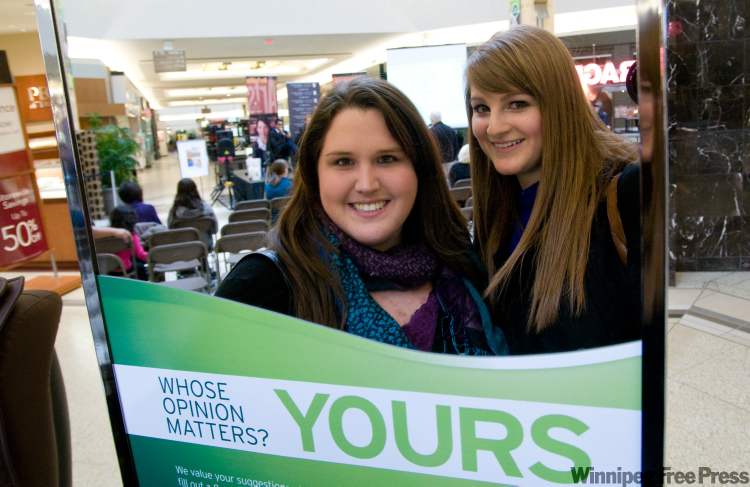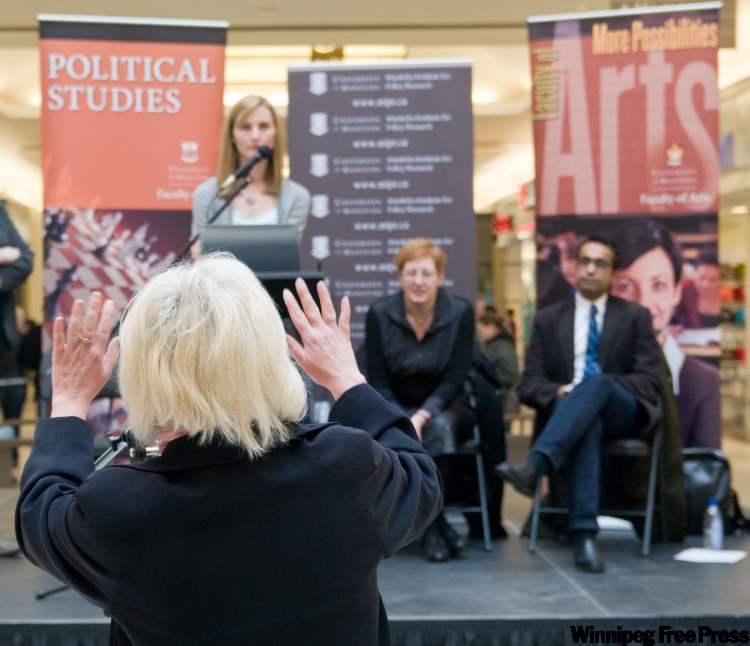Forum tackles voter apathy
Advertisement
Read this article for free:
or
Already have an account? Log in here »
To continue reading, please subscribe:
Monthly Digital Subscription
$1 per week for 24 weeks*
- Enjoy unlimited reading on winnipegfreepress.com
- Read the E-Edition, our digital replica newspaper
- Access News Break, our award-winning app
- Play interactive puzzles
*Billed as $4.00 plus GST every four weeks. After 24 weeks, price increases to the regular rate of $19.95 plus GST every four weeks. Offer available to new and qualified returning subscribers only. Cancel any time.
Monthly Digital Subscription
$4.99/week*
- Enjoy unlimited reading on winnipegfreepress.com
- Read the E-Edition, our digital replica newspaper
- Access News Break, our award-winning app
- Play interactive puzzles
*Billed as $19.95 plus GST every four weeks. Cancel any time.
To continue reading, please subscribe:
Add Free Press access to your Brandon Sun subscription for only an additional
$1 for the first 4 weeks*
*Your next subscription payment will increase by $1.00 and you will be charged $16.99 plus GST for four weeks. After four weeks, your payment will increase to $23.99 plus GST every four weeks.
Read unlimited articles for free today:
or
Already have an account? Log in here »
Hey there, time traveller!
This article was published 04/04/2011 (5417 days ago), so information in it may no longer be current.
In the middle of a crowded shopping mall, over the din of wailing children and loudspeaker announcements, democracy cried out for help Sunday.
Chantel Bage and Suzie DeLuca were among the few who answered the call to save it. The 19-year-old women were at Kildonan Place not to shop, but to take part in a public forum trying to get at the heart of voter apathy.
“I think it’s important to get out there and learn the issues,” said Bage, majoring in women’s studies. The East Kildonan resident said the people who aren’t voting are the ones being left out of decision-making in Canada. She learned at the forum hosted by the University of Manitoba the groups that don’t vote are primarily women, the poor, the uneducated and visible minorities.

She and DeLuca are about to vote in their first federal election and eager to learn the issues and cast their ballots May 2.
“I was super-excited about the civic election,” said DeLuca, a political studies major. “People were laughing at me in the line” at the polling station, she recalled.
Bage and DeLuca want to ignite their passion for democratic participation in others by learning what put the flame out in the first place.
At the mall, they heard three university professors from across Canada who’ve researched voter apathy share some of their findings.
“The majority of Canadians, regardless of age, are cynical” about politics, said Prof. Loleen Berdahl with the University of Saskatchewan. “The majority feel elections rarely deal with issues they feel are important,” she said.
Or they feel they can’t make an informed decision, said Prof. Elisabeth Gidengil from McGill University. There is so much information available that people feel like they’ve been hit by an “avalanche,” she said.
“It’s really hard to sort through all the information out there,” said Gidengil, who helped design the Vote Compass. The online survey was created by political scientists to make it easier for voters to cast an informed ballot. Voters are asked questions about where they stand on issues, then shown the political party with which their answers line up. Close to one million Canadians have used the Vote Compass since it became available last month, she said.
People complain about politicians and the system, but don’t see their own role in voter apathy or how serious the implications are, said Prof. Mebs Kanji from Concordia University.
“We’re not very interested, we’re not very knowledgeable and we’re not very engaged,” said Kanji, as teen “mall rats” and the middle-aged shuffled past the panel that attracted about two dozen participants.
There are whole groups of the population “sitting out,” including the young and visible minorities, he said. “Politicians listen to those who vote.”
What worries Kanji the most is the hopelessness he sees among young voters. Even though the last 100 years has seen more people, including women, become enfranchised and get the vote, there is a sense voting won’t make a difference, he said. “It’s completely disheartening, all the young people who think that change cannot happen.”
Gidengil’s concern is targeted toward a big chunk of Canada’s youth that’s not engaged in the democratic process.

“It’s not the students we have to worry about,” she said, adding they take part in rallies and debates and get involved.
It’s the uneducated youth not voting, she said. “It’s a huge divide.”
Lessons in high school civics won’t get them to the polls because it’s too little, too late.
“They’ve already left the system,” Gidengil said.
The U of M’s “Café Politique” is travelling around Manitoba in the run-up to the provincial election, said Prof. Jared Wesley. Its aim is to get more Manitobans engaged in the democratic process.
“You have to go where the people are,” he said.
For more information, go to www.umanitoba.ca/u2011
carol.sanders@freepress.mb.ca

Carol Sanders
Legislature reporter
Carol Sanders is a reporter at the Free Press legislature bureau. The former general assignment reporter and copy editor joined the paper in 1997. Read more about Carol.
Every piece of reporting Carol produces is reviewed by an editing team before it is posted online or published in print — part of the Free Press‘s tradition, since 1872, of producing reliable independent journalism. Read more about Free Press’s history and mandate, and learn how our newsroom operates.
Our newsroom depends on a growing audience of readers to power our journalism. If you are not a paid reader, please consider becoming a subscriber.
Our newsroom depends on its audience of readers to power our journalism. Thank you for your support.






